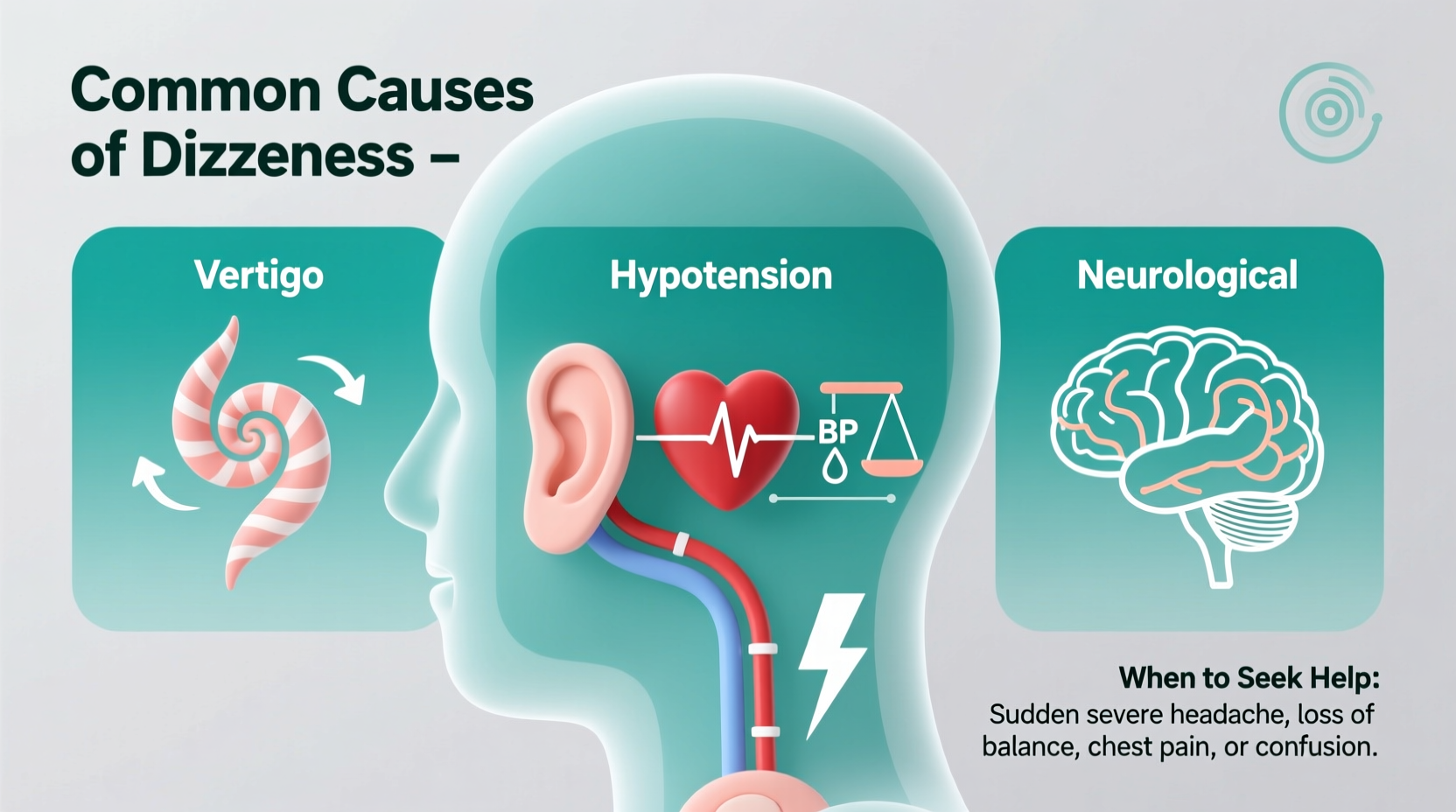Dizziness is a sensation that affects balance, spatial orientation, or stability. It’s not a disease in itself but rather a symptom of an underlying condition. Many people experience random dizziness at some point—perhaps upon standing too quickly, during stress, or after skipping a meal. While occasional lightheadedness is often harmless, persistent or severe episodes may signal a more serious health issue. Understanding the root causes and knowing when to take action can prevent complications and improve quality of life.
Common Causes of Random Dizziness

Dizziness arises from disruptions in the systems responsible for balance: the inner ear (vestibular system), the brain, and sensory nerves. The most frequent triggers are usually benign and easily managed.
- Benign Paroxysmal Positional Vertigo (BPPV): Tiny calcium crystals in the inner ear become dislodged, causing brief spinning sensations with head movement.
- Vestibular Neuritis or Labyrinthitis: Inner ear inflammation, often following a viral infection, leads to vertigo, nausea, and imbalance.
- Low Blood Pressure (Hypotension): Especially orthostatic hypotension—when blood pressure drops upon standing—can cause sudden lightheadedness.
- Dehydration: Inadequate fluid intake reduces blood volume and oxygen flow to the brain, triggering dizziness.
- Hypoglycemia: Low blood sugar, particularly in diabetics or those who’ve skipped meals, results in weakness, confusion, and dizziness.
- Anxiety or Panic Attacks: Rapid breathing (hyperventilation) alters blood chemistry and can induce lightheadedness or a floating sensation.
- Migraine-Associated Vertigo: Some migraines affect balance without significant headache, known as vestibular migraines.
- Medication Side Effects: Blood pressure drugs, sedatives, antidepressants, and antiseizure medications may disrupt equilibrium.
When to Worry: Red Flags That Require Medical Attention
Most dizziness resolves on its own. However, certain symptoms suggest a need for prompt evaluation. These warning signs may indicate neurological, cardiovascular, or systemic disorders.
“Not all dizziness is equal. Sudden onset with neurological symptoms like slurred speech or limb weakness should be treated as a medical emergency.” — Dr. Lena Patel, Neurologist at Boston General Hospital
Seek immediate medical care if dizziness is accompanied by any of the following:
- Chest pain or irregular heartbeat
- Difficulty speaking or swallowing
- Sudden hearing loss or ringing in one ear
- Double vision or inability to focus eyes
- Fainting or near-fainting episodes
- Severe headache unlike any before
- Weakness, numbness, or coordination problems on one side of the body
- Prolonged dizziness lasting hours or recurring frequently
These could point to conditions such as stroke, transient ischemic attack (TIA), arrhythmia, or acoustic neuroma—a rare benign tumor on the auditory nerve.
Diagnosing the Cause: What to Expect at the Doctor's Office
Accurate diagnosis starts with a detailed history. Your doctor will ask about the nature of the dizziness—whether it feels like spinning (vertigo), lightheadedness, or unsteadiness—and its timing, triggers, and associated symptoms.
Physical exams may include:
- Ear inspection for signs of infection or wax buildup
- Neurological testing (balance, coordination, eye movements)
- Blood pressure measurement in lying and standing positions
- Dix-Hallpike maneuver to test for BPPV
Depending on findings, further tests might be ordered:
| Test | Purpose | What It Detects |
|---|---|---|
| Audiometry | Hearing assessment | Cochlear or nerve-related hearing issues |
| Videonystagmography (VNG) | Eye movement tracking | Vestibular dysfunction |
| CT or MRI scan | Brain imaging | Stroke, tumor, structural abnormalities |
| Electrocardiogram (ECG) | Heart rhythm monitoring | Arrhythmias or conduction issues |
Managing and Preventing Episodes
Once serious causes are ruled out, lifestyle adjustments can significantly reduce dizziness frequency.
Step-by-Step Guide to Reducing Dizziness Risk
- Stay Hydrated: Drink water consistently throughout the day. Aim for 6–8 glasses, more in hot weather or after exercise.
- Eat Balanced Meals: Avoid long gaps between meals. Include protein, complex carbs, and healthy fats to stabilize blood sugar.
- Review Medications: Ask your doctor if any prescriptions or over-the-counter drugs could contribute to dizziness.
- Limit Alcohol and Caffeine: Both can affect inner ear function and blood pressure regulation.
- Practice Balance Exercises: Simple routines like tai chi or standing on one foot improve vestibular resilience.
- Use Caution with Head Movements: If diagnosed with BPPV, avoid quick turns or lying flat suddenly.
Real Example: Maria’s Experience with BPPV
Maria, a 58-year-old teacher, began experiencing brief spinning spells every time she rolled over in bed. At first, she dismissed it as fatigue. After a few weeks, the episodes worsened, sometimes making her nauseous. Her primary care physician performed the Dix-Hallpike test and confirmed BPPV. She was referred to a physical therapist who taught her the Epley maneuver—a series of head movements that reposition the inner ear crystals. Within two sessions, her symptoms improved dramatically. “I didn’t realize something so simple could fix years of morning dizziness,” she said.
FAQ: Common Questions About Random Dizziness
Can stress really cause dizziness?
Yes. Chronic stress and anxiety activate the sympathetic nervous system, increasing heart rate and altering breathing patterns. Hyperventilation reduces carbon dioxide levels in the blood, leading to lightheadedness, tingling, and dizziness. Managing stress through mindfulness, breathing exercises, or therapy can alleviate these symptoms.
Is it normal to feel dizzy when standing up?
Occasionally, yes—especially if you stand too quickly. This is called orthostatic hypotension and is common in older adults or those on blood pressure medication. However, frequent or severe episodes warrant evaluation to rule out dehydration, autonomic dysfunction, or heart conditions.
Can inner ear problems cause long-term dizziness?
Some conditions like Ménière’s disease or chronic vestibular insufficiency can lead to recurrent or persistent dizziness. Early diagnosis and treatment, including dietary changes (low-sodium for Ménière’s) or vestibular rehabilitation therapy, can help manage symptoms effectively.
Conclusion: Take Control of Your Balance and Health
Random dizziness is more than just an inconvenience—it can impact daily functioning, increase fall risk, and signal deeper health concerns. While many causes are minor and self-limiting, recognizing red flags and seeking timely care is essential. With proper diagnosis, targeted treatment, and preventive habits, most people can regain stability and confidence.









 浙公网安备
33010002000092号
浙公网安备
33010002000092号 浙B2-20120091-4
浙B2-20120091-4
Comments
No comments yet. Why don't you start the discussion?